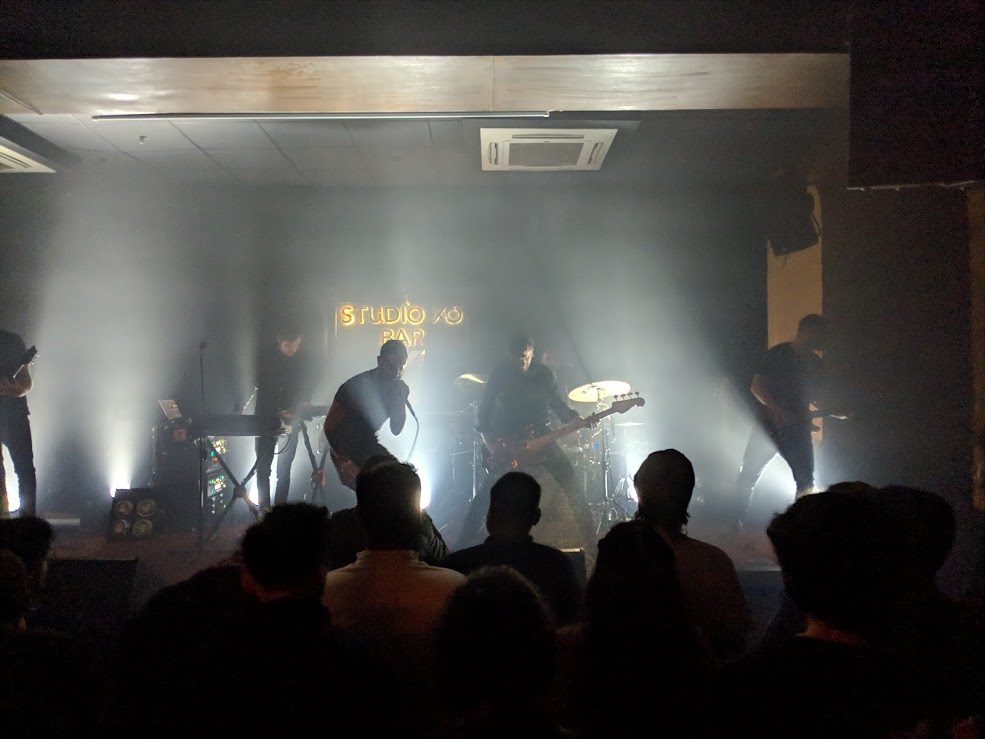
 Photo Courtesy: Dhruv Bhutani, The Ocean Collective FB Pages
Photo Courtesy: Dhruv Bhutani, The Ocean Collective FB Pages
The last time The Ocean came to India, their experience was far below what a band of their stature deserved; plagued by organizational and promoter issues, it was far from ideal. This time, they are back under the care of Unscene for a longer tour which includes stops at Delhi, Mumbai, Bangalore, Hyderabad and Guwahati. They also plan to come back to India every year to play, possibly at festivals or fests. Ahead of last night’s show at Delhi (supported by Ioish), the band’s founder and guitarist Robin Stapps shared his thoughts with Randeep Kaur on the band’s process and journey.

RSJ: The last time you were in India (2014) you couldn't see too much, unfortunately. This time you're doing 5 cities. Any expectations/ things you would like to see?
Well, we spaced it out quite a lot this time so have some time to see things, so that’s great. We just had 4 days off before this show; we went to Jodhpur, took a car and drove through the desert. We shot a clip for the video for ‘Permian: The Great Dying’ (a track off their latest release Phanerozoic I: Palaeozoic, the second part of which will release this year). This has just been Loic (Rossetti, vocalist) and I; everyone else landed yesterday. After Delhi, we have 2 days in Mumbai, then Bangalore, then we have to fly to Guwahati, plan to go to Kaziranga… We hope to see more than just cities this time and get to meet people.
RSJ: The subject matter of your music deals with a variety of themes; world history, evolution, religion, the ages of geographical change etc. Where/ from whom did all of you develop interest in these subjects and themes?
They’re just things I’ve been interested in for most of my life. I studied philosophy and geography; it’s an odd combination, but most of our lyrics are about that. This album is titled Phanerozoic, which is the aeon we currently live in but started 500 million years ago, and all the songs are titled according to the eras contained within this age. Simultaneously, the lyrics themselves don’t talk about paleontological topics, because it doesn’t really make sense to write about a time that humans didn’t exist. So there is a meta level to the lyrics that is mostly philosophical. In this album, that part is inspired a lot by Friedrich Nietzsche and his idea of Eternal Return, which is an idea that exists across many countries and cultures; some old Indian writings also deal with this… They’re just things I’m interested in. I don’t like to write about Satan that much, like many metal bands.
RSJ: Aeolian was at the time different from your usual sonic style; featuring very little orchestration or keys. It showcased a more skeletal and brutal side of the band. Was that a one-off experiment (because it was supposed to part of a double album with Fluxion)? Are there specific sonic departures you've made over the years that stand out to you?
Those two albums were out in 2005 and 2006. That was the first iteration of this dichotomy we had with the double album. Our next album, Precambrian, also had two parts; the same went for Heliocentric and Anthropocentric (which were two different angles on one topic). The new one is too; the reason why we always end up writing double albums is two things. One of them is that I write a lot of material, so by the time we enter the studio, there’s usually more music than what can fit in one album. The other reason is the material is quite diverse; some of it is heavy, short and punchy while some is more orchestral and expansive. I don’t think that usually goes together very well, so I like to split it up. That was what I tried to do with Aeolian and Fluxion; Aeolian was heavier and shorter and Fluxion was more orchestral and elaborate. The band has always had two sides; we come from a hardcore background, so there’s that raw energy, but we also have a sort of post-rock side. You can also see it in our audience. Often a lot of people don’t know how to behave at our gigs, which is funny; some people want to go nuts and some people want to close their eyes and just be immersed. That is what we are, though.
RSJ: Your lineup has undergone many changes over time. While this is obviously not ideal, do you find that there is a continuous stream of new influences and musical background coming into the band's songwriting?
The songwriting in the band has always been done by me since the beginning. So the songwriting hasn’t really been affected, but the way we recorded has. This new album is the first time we rehearsed as a band before recording. On all the previous records, I recorded pre-production tracks, everyone learnt their parts and we recorded, but this time we took a month to rehearse and work together on details. For example, Matias (Hagerstrand, bassist since 2015) wrote his own basslines this time. So I still wrote the structures and songs, but each member has contributed a lot more of their signature style, drumming and bass especially. I do feel this is our strongest lineup till date. The reason we had so many lineup changes in the past is that we didn’t really have too much to offer as a band; we were young with no record deal or booking agencies, so it wasn’t easy to find musicians who would fully commit. On the other hand, many people had different goals, like to start families or other careers, and didn’t want to tour after a while… I think change is a natural phenomenon, but I think this lineup will last for a while. We have similar goals and are good friends, which is not to be taken lightly. When we sit together in a bus half the year, we’re also old enough to appreciate the privilege this band is.

RSJ: Pelegial and Phanerozoic I have an instrumental version of the entire album as part of the release. Do you feel like you write in a more instrumental way or do you approach the songwriting process from melody/vocal ideas?
Almost always, the songwriting happens with instrumentals first, and then the vocals are added at the end. That’s what happened with Pelagial; it was written to be an instrumental album. At the time, our vocalist Loic was sick and had vocal cord issues, so we gave him time to recover and decided to write instrumentally. The concept also made sense from an instrumental point of view; it’s a journey from the surface to the bottom of the sea, through five different depth zones. So as this is visualized, it gets deeper and lower in tuning; I didn’t want lyrics about giant squids fighting whales, which doesn’t really make sense. So it made sense as an instrumental album. But then Loic got better and recovered; at first we decided to put vocals on just the last song, but we kept going and eventually the entire album had lyrics. So it was added at the end. Phanerozoic was different. I knew there’d be vocals for all the songs, but we still released the instrumental, and I think we’re going to continue doing this. I listen to a lot of instrumental music. Even when I like a band’s singer, I like to have an extra instrumental version, because it makes you pay attention to other details in the music that you wouldn’t otherwise notice consciously. I wish more bands did that, and I think we’re going to keep doing it. The mixes also differ; for example, the track ‘Devonian’ with Jonas (Renkse) from Katatonia had cello parts, but they clashed with his vocals, so the ‘vocal’ version of the songs does not have the cellos we had recorded. He did his vocals without hearing the cellos, so we couldn’t have in the vocal version but could bring it in for the instrumental version. It just allows different perspectives on our own music.
RSJ: The band gained a lot of fame for its detailed concept albums. Since they are so dense, what is the usual process for making an album with such a clear, defined direction? Since the subjects you cover are so vast, is there an element of research and learning that goes side by side with the songwriting process?
Yes, there is. The basic ideas are there, and they’re things I’m genuinely interested in, not just on a superficial Wikipedia-level. So when I go into detail, I do a lot of reading; about the Silurian age, for example. Writing lyrics is the most-consuming aspect. Conceptualizing the whole thing, of which lyrics is a part, but also artwork that follows the same thread and so on… That takes a lot of time. The music is usually written very quickly and then lyrics and packaging… For example, the new album is going to come in a wooden box with authentic prehistoric fossils. We try to do a few out-of-the-box concepts; so all that takes time. Especially lyrics; I find that music flows out of me quite easily, but there are times where I sit writing lyrics the whole day and then throw it all out. For this new record, the music came first, then Loic created vocal lines, and then I wrote lyrics over those. Loic first sings without lyrics; he closes his eyes and sings gibberish. Then I record that, and write lyrics over the melodies. It’s a bit unusual; Loic works better without any linguistic limitations; sometimes he sings French, sometimes English and sometimes an unknown language, and those are often the best takes, so I just write words over it.
.jpg)
The Ocean’s India tour includes stops at 5 cities from 10-18 January. Other supporting acts include Orchid, Jatin Talukdar Project, Jammers’ Graveyard and Histillion among others.
To get more details about tickets and gigs click here
Steven Wilson and Mikael Akerfeldt’s 2012 collaborative album is arguably more important than anything else either artist has ever done




Leave a comment